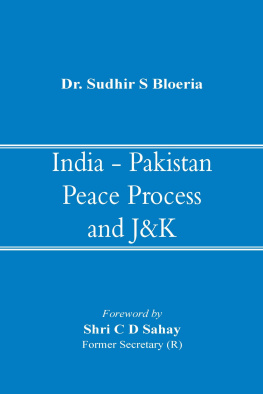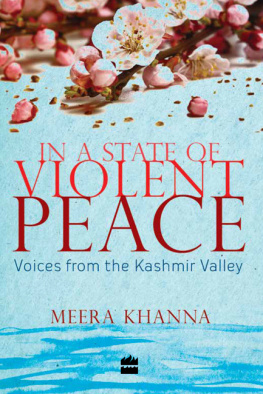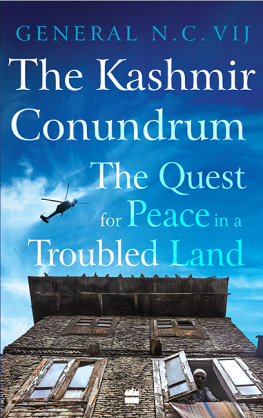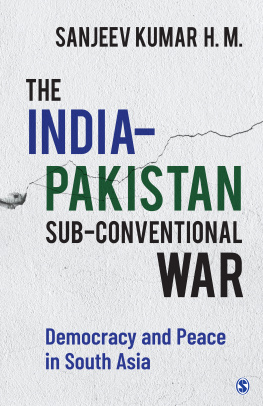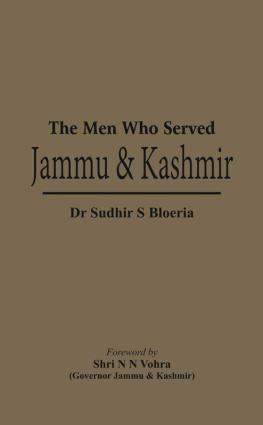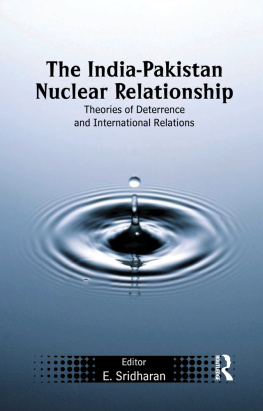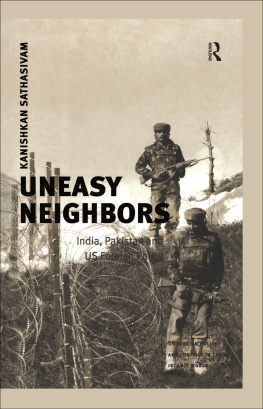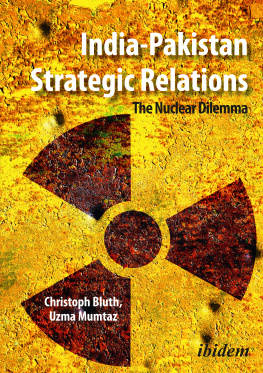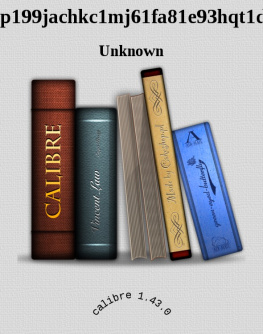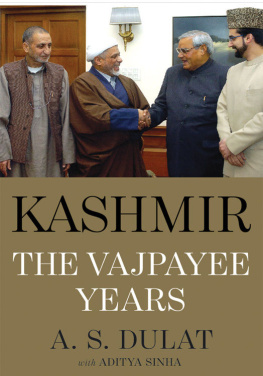IndiaPakistan Peace Process and J&K
First Published in India in 2018
Published by
Vij Books India Pvt Ltd
(Publishers, Distributors & Importers)
2/19, Ansari Road
Delhi 110 002
Phones: 91-11-43596460, 91-11-47340674
Fax: 91-11-47340674
e-mail:
web : www.vijbooks.com
Copyright 2018, Sudhir S Bloeria
ISBN: 978-93-86457-97-4 (Hardback)
ISBN: 978-93-86457-98-1 (ebook)
Price : 995/-
All rights reserved.
No part of this book may be reproduced, stored in a retrieval system, transmitted or utilized in any form or by any means, electronic, mechanical, photocopying, recording or otherwise, without the prior permission of the copyright owner. Application for such permission should be addressed to the publisher.
The views expressed in this book are of the author in his personal capacity.
Being asked to write the foreword of any book is always a matter of great honour, more so when the book is authored by a very dear friend of decades; an acknowledged expert on J&K affairs and when the subject covered is India-Pakistan relations. But it is also a great challenge since the theme relates to the most complex aspect of India-Pakistan relationship Peace Process and J&K.
Yet, I decided to take up the challenge, not because I claim the required expertise on, or familiarity with, the entire gamut of issues involved. I did it simply because I didnt have the option to say no to Shri Bloeria; with whom my relationship goes back to 1993-95 when I was posted to J&K as Commissioner, Special Bureau, Govt. of India. I met him first time when he was Principal Secretary to the governor Gen. K.V. Krishna Rao. That marked the beginning of a relationship that has over the years, grown only stronger in content and depth.
Those were the worst days of militancy in J&K. When, why and how it started and progressed have been recorded in detail and analyzed in depth by the author, tracing the developments right since 1931 with the formation of the Moslem Conference headed by Sheikh Sahib, the birth of National Conference in 1938, developments during the especially turbulent years of Partition, the military action of 1948-49 etc. Attention has been given to the internal political manipulations and instability, absence of focused approach to developmental activities and failure to effectively deal with initial symptoms of militancy as these first surfaced. Having had the benefit of observing these issues through different phases, from a ring side seat, the narratives in this book should be taken as authentic; compulsory reading for anyone looking for in-depth and unbiased account of the extreme complexities surrounding the Kashmir story.
Since the topic of discussions is India-Pakistan Peace Process, considerable space and attention has also been devoted to the developments taking place in parallel, on the other side of the border. A reading of these, clearly explains the reasons for absence of formal, structured and substantive dialogue between the two countries for many years, till PM Vajpayee decided to undertake the famous Bus Yatra to Lahore on February 22, 1999 and the signing of the Lahore Declaration with PM Nawaz Sharif. The great euphoria was however, short-lived as the Pak Army Chief Gen. Musharraf, in an act of utter betrayal launched the Kargil War (May-July, 1999).
One would have thought that this act of madness would have conclusively derailed the peace process, particularly as the IC-814 hijacking quickly followed in December 1999. It was an ISI backed operation to secure the release of one of their favourite militant leaders, Masood Azhar of Harkat ul Ansar (subsequently renamed as Jaish e Muhammad after Azhars release).
But Vajpayee was fully committed to the peace process, endorsing the short-lived Hizbul Mujahideen ceasefire in July 2000, subsequent Non-Initiation of Combat Operations (NICO) also known as the Ramzan Ceasefire (Nov. 2000) and extending an invitation to Gen. Musharraf for the Agra Summit that eventually took place in mid-July 2001. The author has incisively summarized the Summit by quoting the two leaders on page 195-196 in the book. But more significantly, all these initiatives failed as Musharraf the commando could not fathom Vajpayee the Chanakya (page 194).
The next set of initiatives had to pend for a while on account of successive acts of terror in all of which Pakistans involvement was writ large. Notably, it began with the 9/11 attack on the World Trade Centre in New York, (Sept 2001), on J&K Assembly in Srinagar (Oct. 1, 2001), attack on Indian Parliament (Dec. 2001) and at Kaluchak (May 2002). With these, Kashmir watchers perhaps justifiably thought the proverbial last nail in the coffin of the peace process had been driven in.
But once again the Chanakya in Vajpayee surprised everyone by extending a hand of friendship towards Pakistan, at a public rally in Srinagar on April 18, 2003. Later, in an emotionally charged speech in the parliament, he said, this would be my third and final effort at improving relations with PakistanNow, whatever happens, will be decisive. (Page 217).
Govt. of India followed up these with a slew of Confidence Building Measures (CBMs) announced on October 22, 2003 and Pakistan offered Eid Ceasefire in November. The author acknowledges (page 224) that This was probably the most successful cessation of hostilities between the two countries. (I can personally claim some credit for these and other related developments that followed-CDS). In December that year Musharraf publicly announced that Pakistan was conditionally prepared to give up its traditional stand of implementing UN Resolutions (Page 225). And then came the Vajpayee-Musharraf meeting in Islamabad and the famous joint statement of January 6, 2004 stating that Pakistan will not allow any territory under its control to be used to support terrorism in any manner and that India will resume dialogue that will lead to peaceful settlement of all bilateral issues, including Jammu and Kashmir, to the satisfaction of both sides. (Page 227).
These developments marked the resumption of the bilateral Composite Dialogue with Pakistan on the one hand and with the APHC leaders on the internal front. But, as usual there had to be a setback and that came in with the NDA government losing the Parliamentary election in 2004. However, contrary to the general perception, the peace process continued under the UPA government of Dr. Manmohan Singh (MMS). The new prime minister, in his characteristics quiet manner, started giving greater thrust to the CBMs initiated by the previous government through a number of new initiatives while strengthening some of the existing ones. Recounting these in Chapter VII, the author highlights the holding of FS level meeting in June 2004 followed by those between the two Foreign Ministers in September and MMS and Musharraf in New York on the sidelines of the UNGA session. For easy recall, the first six months scorecard of the UPA has been summed up on page 241-2 and it looks pretty impressive. Of particular note were initiatives on the internal front, including a commitment to unconditional dialogue with anyone and everyone who abjures violence. In September 2005, the top APHC leaders met PM and in January 2006 there was interaction with non-APHC leads too. And then came the most notable one; the first Round Table Conference in New Delhi (Feb. 2006) followed by the second RTC (in Srinagar (May. 2006) and the third one in April 2007. Regrettably, under obvious advice from their mentors across, APHC leaders missed out on a great opportunity to contribute to the internal political process on the flimsy ground of inclusion of Pakistan in the deliberations.

